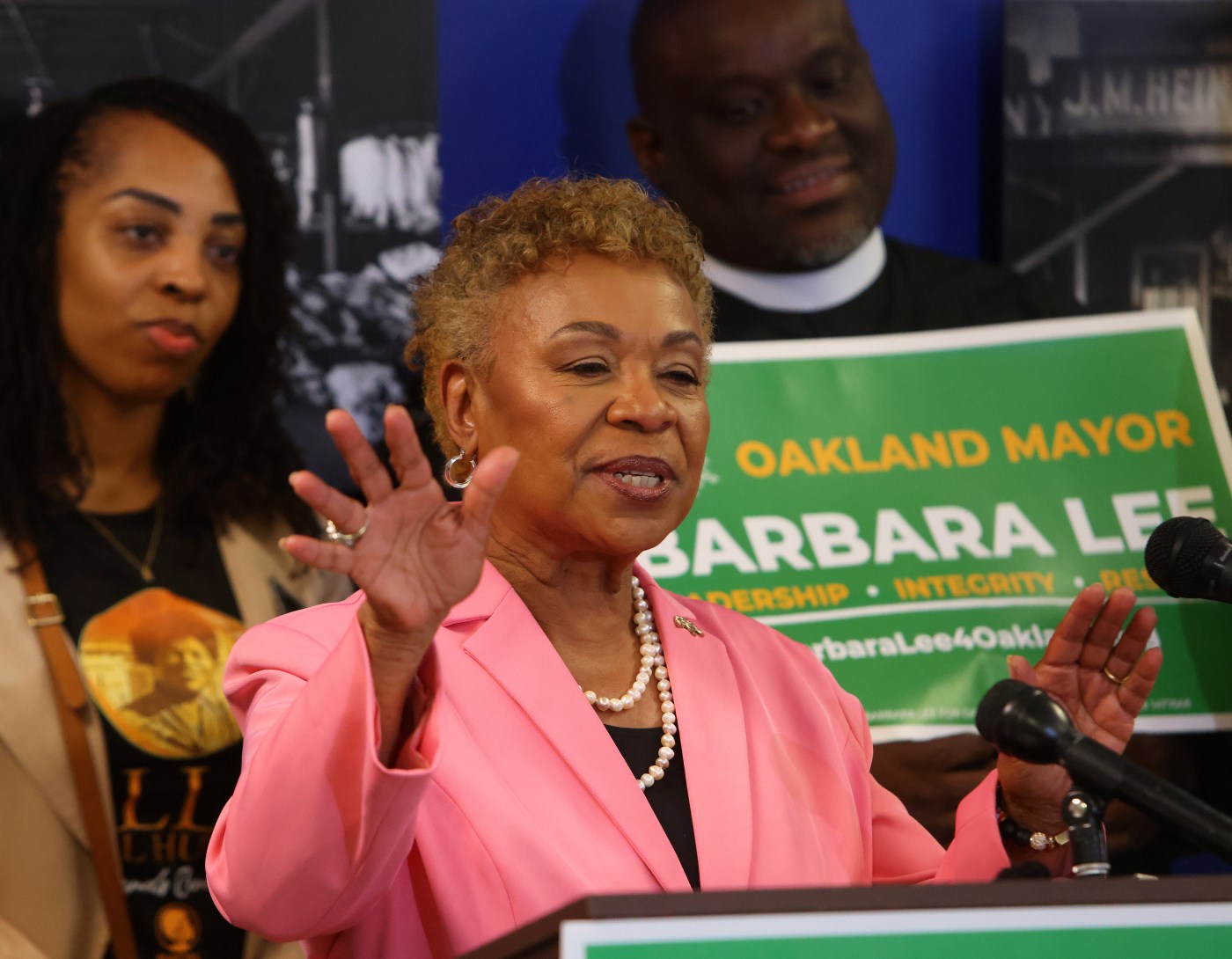
Oakland Mayor-elect Barbara Lee, in her first post-election press conference, promised last week to unify warring political factions while addressing the city’s fiscal, public safety, housing and homeless challenges.
But when it came to questions about the city’s budget, she punted. That can’t continue. For none of Lee’s promises will come to fruition if she can’t resolve Oakland’s fiscal crisis.
Related Articles
Oakland corruption case: Attorneys push for more oversight of data seized by feds
Superintendent’s mysterious firing mars Oakland schools’ exit from outside control
Barbara Lee, Oakland’s new mayor-elect, lays out vision for first 100 days of term
Barbara Lee elected Oakland’s next mayor over Loren Taylor
How Oakland’s tight mayoral race may reach the finish line
The former congressmember insisted during her mayoral campaign that city-employee layoffs “would be the last resort.” But, as we said in our editorial endorsement of her, no meaningful solution can avoid layoffs and/or significant concessions from city labor unions.
And, given Oakland’s massive structural budget deficit, Lee will need outside financial experts to help unsort chaotic and opaque financial information coming from City Administrator Jestin Johnson’s office.
Emphasizing the magnitude of the crisis, from November to February, Moody’s, Fitch and S&P downgraded the city’s bond rating — the latter two agencies cutting it by two notches.
Interim Mayor Kevin Jenkins is scheduled to release on Thursday a proposed two-year city budget for the cycle starting July 1. While Jenkins is the official author, he says he has had daily conversations with Lee, who won’t be sworn in until mid-May. And Lee says she will propose changes she thinks are necessary.
Lee must go further. She must own this budget.
Unrealistic promises
Lee was elected to fill the remainder of recalled Mayor Sheng Thao’s term, which runs through 2026. So this budget could cover the entirety of the replacement mayor’s tenure.
And it will test whether Lee is the great unifier she claimed to be during the campaign. While the mayor has authority under Oakland’s charter to propose the spending document, it’s the eight City Council members who determine the final plan.
The question now is whether Lee will make hard choices and can persuade the City Council to do likewise — whether she can move the city past Thao’s strategy of plugging holes with temporary funding and, instead, align long-term revenues and expenditures.
Lee can’t solve the budget crisis on the revenue side of the ledger. She campaigned on the notion that, as a former member of Congress, she could bring home more federal funding. With the current Republican Congress and President Trump in office, that idea is fantasy.
Similarly, Lee’s hopes for revenue growth through economic development are unrealistic unless the city can help residents, who are on edge, and businesses feel safe. With substandard police staffing and overflowing crime, residents want more police, which requires making tough cuts elsewhere.
More tax hikes also are not the answer. While Oakland voters have approved levies to keep municipal government afloat, their leaders keep spending beyond the city’s means. Officials keep promising more and better services with each tax measure, but then fail to deliver on key items like road repairs and police protection.
Troubled administrator
For the past two years, Oakland had a mayor who lacked fundamental understanding of the taxes residents pay (as I warned before Thao was elected), cared more about pleasing her public employee labor union backers than responsibly leading the city and, according to federal corruption charges she now faces, lacked a moral compass.
While Thao is gone, Johnson, the city administrator she brought in, remains at the management helm. Less than four weeks after he started his $340,000-a-year post, he signed off on a recommendation that used misleading comparisons to urge that the City Council increase Thao’s annual salary from $203,000 annually to $277,975. (In the end, the council granted only a small fraction of that.)
During Johnson’s tenure, city finances have deteriorated as officials looked to one-time revenues to close gaping budget shortfalls. And when his finance director, Erin Roseman, warned of the threat of insolvency, her public report was quickly withdrawn.
To be sure, Johnson serves at the pleasure of the mayor and could lose his job at any time. But the mark of a professional city administrator is the willingness to speak truth in the face of political adversity.
In February, Johnson and Roseman forecast the city faces a $140 million annual structural deficit starting next fiscal year for the city’s general fund. That’s roughly 15% of projected expenditures. But Johnson won’t say what assumptions and details went into those calculations.
Now he is helping Interim Mayor Jenkins cobble together the city’s two-year budget plan. But he has put the cart before the horse.
To assemble a responsible budget, one must have reliable long-range forecasts. Only then can you see the structural effects of any changes. In Oakland, that long-range document is the city’s five-year financial forecast, prepared every two years. The last one was presented in March 2023. The next one should have been released last month and used as a basis for preparing the budget.
Johnson’s spokesperson first said the new five-year forecast was expected April 8. Now he says it will not be released until sometime in May. In other words, the five-year forecast, which should guide the preparation of the budget, won’t come until after the budget.
It’s this sort of sloppiness that helped drive the city into its current fiscal hole. The question now is whether Lee will stand for more of the same or bring in administrators who can help her put an end to the financial recklessness.
It’s time for real leadership and fiscal discipline in City Hall. Whether Lee can provide that remains to be seen.
Reach Editorial Page Editor Daniel Borenstein at [email protected].